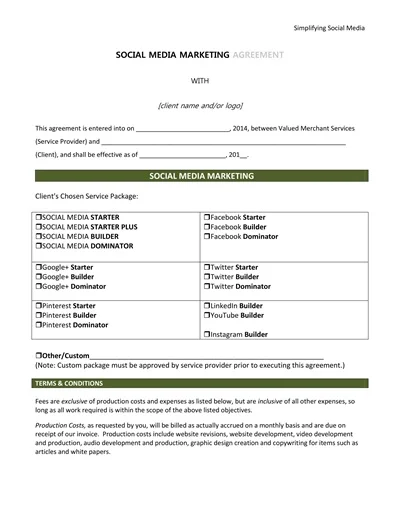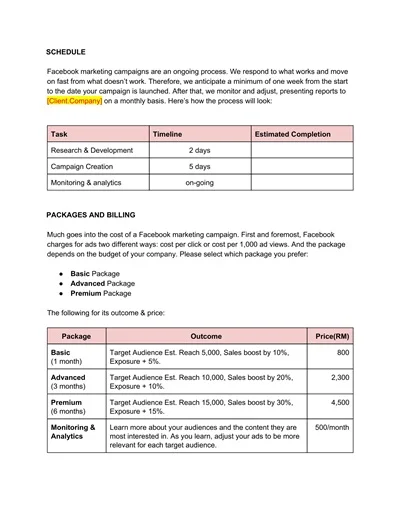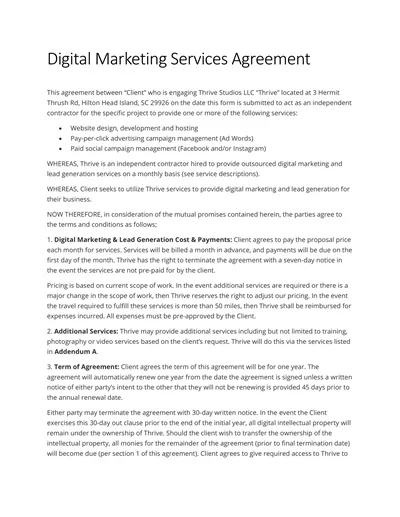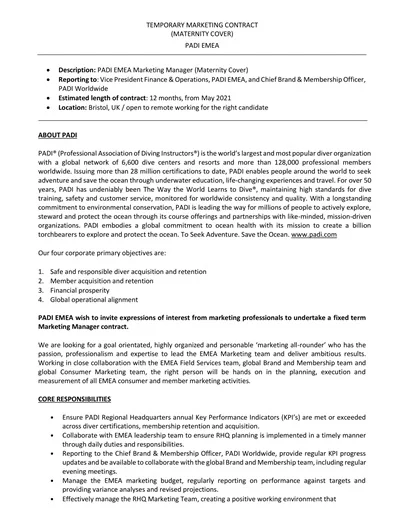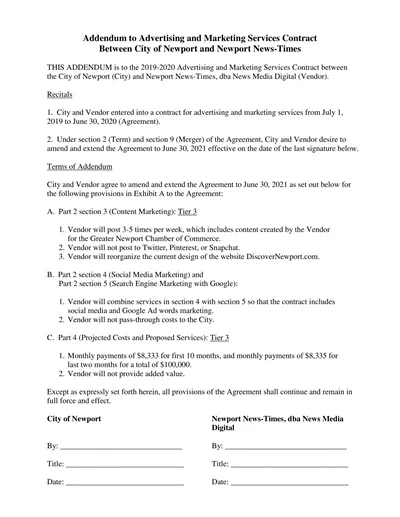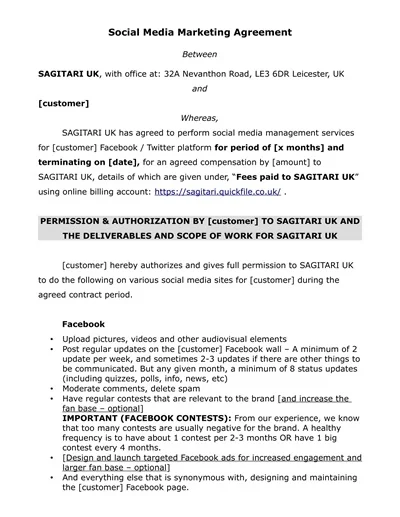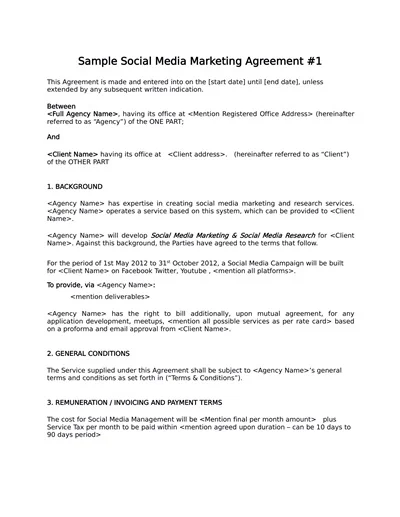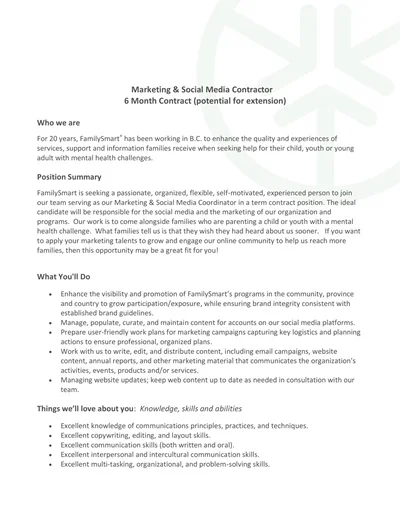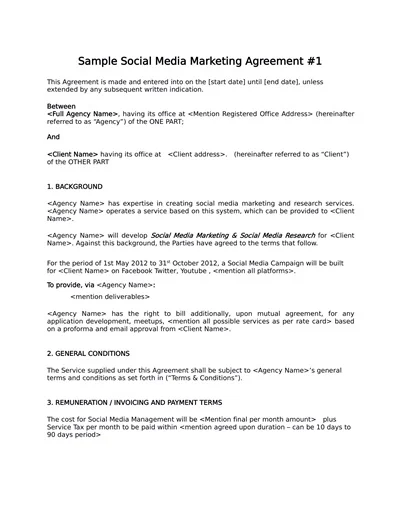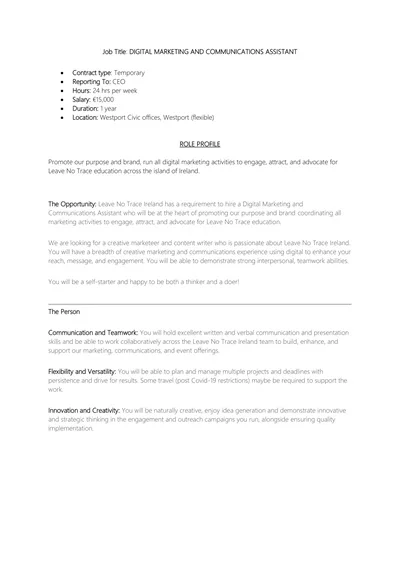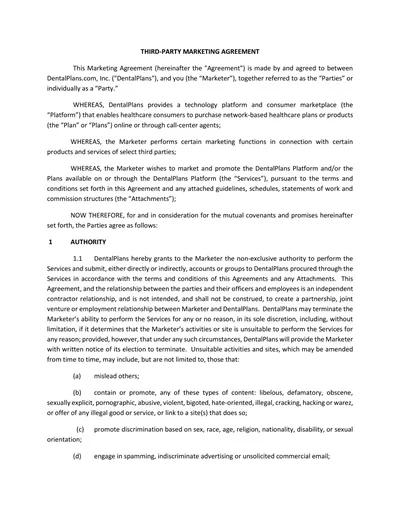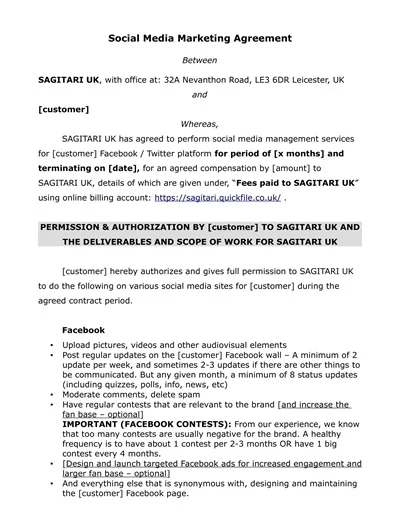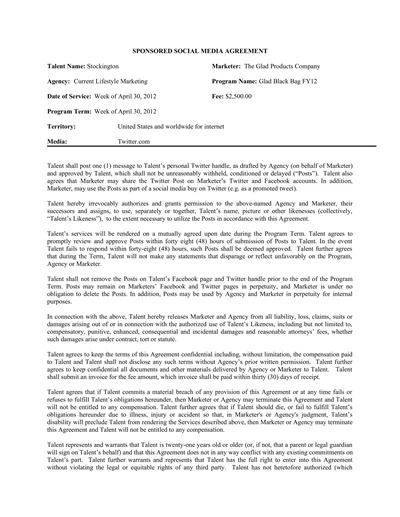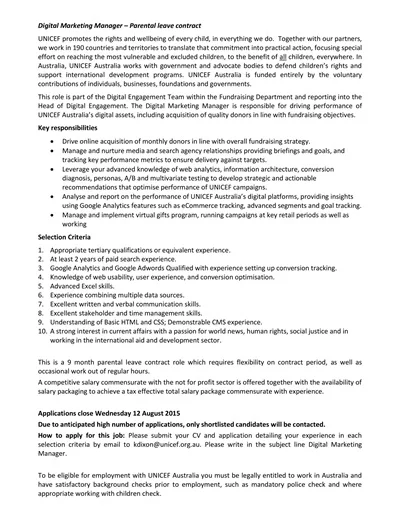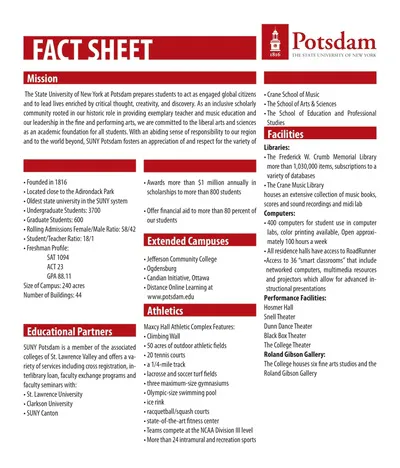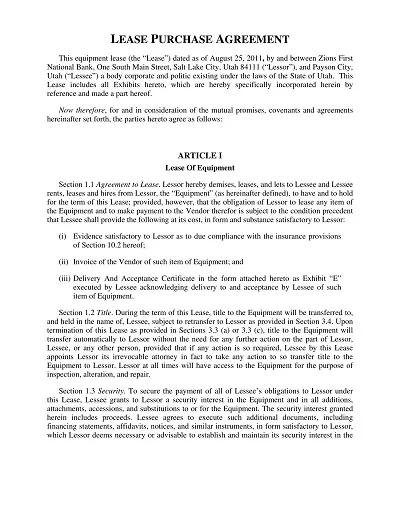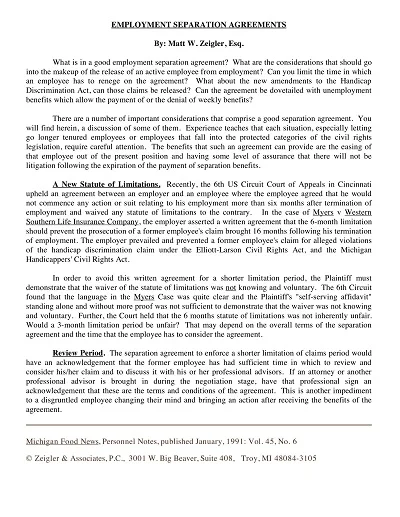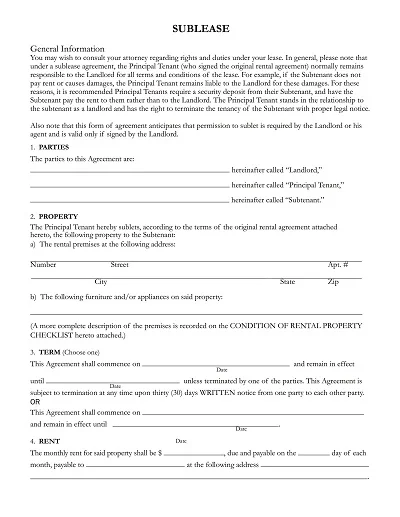Social Media Marketing Contract Template is a strategic tool to streamline your collaboration with a social media marketer. Its comprehensive structure outlines everything from expectations and responsibilities to helping the development of a productive partnership.
This all-encompassing template accommodates the unique needs of entities of all sizes, small businesses, large corporations, or independent artists. It is a roadmap for successful social media marketing attempts, promoting transparency and defining achievable goals. Embrace this step towards enhancing your digital footprint and using the vast potential of social media marketing.
Download Free Simple Social Media Marketing Contract Templates
What is a Social Media Marketing Contract?
Social Media Marketing Contract is a legal contract between the businessman or woman/ an organization and the social media marketer. This document will define the project’s parameters, what needs to be delivered, the time frame for the delivery, and the price for the service to be offered.
It defines the marketer’s position and duties regarding handling and improving business pages on relevant social media sites. In other words, this document sets out all the terms and conditions under which parties will undertake to work, requires all parties to be responsible for their activities, and therefore encourages right and equitable relations between the partners.
Why is a Social Media Marketing Contract Important?
A Social Media Marketing Contract is crucial for several reasons:
- Clarity and Transparency: Having a Contract for Social Media Marketing would be advantageous because it helps negotiate and cooperate with the contract provisions and duties. The obligations, expected behaviors, and production expectations are clearly defined by both the contracting parties, and each gets to understand or is aware of the expected behaviors in exchange for intended results or consequences.
- Protects Both Parties: In the business between the company and the social media marketer, the Social Media Marketing Contract provides precedence in case of negligence or failure to meet set performance standards on either side. This agreement acknowledges that both parties have understood the terms of this conversation and will be used in disagreement or miscommunication.
- Establishes Deliverables and Timelines: It translates the strategic partnership to a strategic map with the functional and temporal arrangement of outcomes. It supports creating and orchestrating a standard stove and mutual understanding and obligation by attaining tangible goals per a defined time frame.
- Promotes Professionalism: A Social Media Marketing Contract contains the terms of and sets out the working relationship of the business, on the one hand, and the marketer or marketing firm, on the other. It sets acceptable standards and behaviors and makes the space within which one is most effective for getting things done and accomplishing goals.
Types of Social Media Marketing Contracts
Understanding the different types of Social Media Marketing Contracts is crucial to choosing the one that best fits your needs:
Project-Based Contract
A Project Based Contract is ideal for short-term collaboration that is tightly focused and work-orientated. It outlines a precise set of goals and timeframes, the precise work to be done, the expected results within the framework of the project, and the remuneration for it.
Retainer Contract
A Retainer Contract is a sustainable cooperation that arranges for the marketer to be paid a retainer fee for providing several agreed services. Such a contract fosters a long-term, or long-lasting, partnership between the business and the marketer.
Performance-Based Contract
In a Performance-Based Contract, the marketer is incentivized through KPIs or results, which may comprise the following rates, engagement, or conversion.
Hybrid Contract
As the name suggests, a Hybrid Contract includes characteristics from the above types and presents flexibility. For instance, a business can agree on a flat monthly rate for continuous tasks and extra motivation to reach other goals in the KPIs.
Key Components of a Social Media Marketing Contract
Here are some key components of a Social Media Marketing Contract:
- Scope of Work: This remains fundamental to the contract and sets out how the marketer will address the client’s needs by providing services. This may encompass creating content, managing social media accounts, ad campaigns, data analysis, etc. It is important to ensure this section is explanatory and as clear as possible to help prevent a wrong interpretation of something further in the paper.
- Payment Terms: Scot is covered in this section, which includes the amount of money the client will have to pay for the services, the date by which payment should be made, and the mode of payment to be used. Another important factor that cannot be left without consideration is the section that addresses issues related to fines or penalties if the payment is not made on time or if it is not made at all.
- Confidentiality and Intellectual Property Rights: These clauses ensure that no disclosure of information to be kept discreet is divulged during work. It also defines ownership of the rights on work done; ordinarily, the payer bears all rights on all creative works done by the freelancer during the contract period.
- Termination Clause: This places the terminal for the contract after certain conditions are met in the contract. The two signify contractual abnormality, lack of payment, or unsatisfactory execution of service provisions and provisions.
- Dispute Resolution: This section lists the agreed method of dispute resolution, which is either mediation, arbitration, or litigation, and it is known as the ‘dispute resolution clause.’ This can help to avoid such situations regarding expensive trials or prolonged court sessions.
How to Create a Social Media Marketing Contract Template
To create a social media marketing contract template, follow these steps:
- Introduction: First, you should provide the rationale for forming the agreement. The following information should also include the contracting parties’ names and when the contract became effective.
- Services Provided: Describe the services to be provided, as well as the tasks, feasibility, and timeframe for each step by step.
- Payment Terms: While formulating the contract, it is necessary to define the payment terms for the services provided, payment frequency, and any fines for delay.
- Confidentiality: Use a clause on how information deemed sensitive within the business will be handled, indicating what such information is and how both parties shall respond.
- Termination Provisions: Explain circumstances under which the contract can be terminated, the period within which the party can provide notice of termination, and obligations in case of termination.
- Intellectual Property Rights: State the owner of the work product and give measures on how the issue of intellectual property shall be managed.
- Performance Metrics and Outcomes: Explain how and to what extent the performance will be assessed, using key performance indicators (KPIs) and elaborate on the expectations.
- Dispute Resolution: Stipulate how any issues that can possibly arise during the contract will be handled.
- Signatures: Provision should be made for the client’s and service provider’s signature and date.

